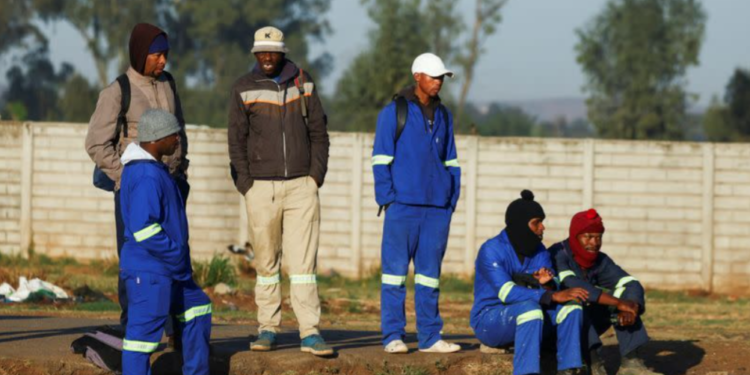Sep 23, 2024 Story by: Editor
JOHANNESBURG (Reuters) – The leader of South Africa’s flagship Black economic empowerment program plans to introduce new incentives and potential fines to boost corporate participation and prevent the exploitation of the system designed to address the country’s deep-rooted inequality, he stated.
The African National Congress (ANC), which governed unchallenged for three decades before losing its parliamentary majority in the May elections, faces significant pressure to improve the lives of Black citizens still disadvantaged by the legacy of white minority rule.
Implemented in 2003, the empowerment law established a scorecard system that incentivizes companies to hire and promote Black individuals by offering tax breaks and access to government contracts.
However, 20 years later, Black unemployment remains five times higher than that of white citizens, and South Africa continues to have the highest income inequality globally, according to the World Bank. Critics argue that the empowerment policy has fallen short.
“There’s no society that can be viable with this level of inequality,” Tshediso Matona, head of the Broad-based Black Economic Empowerment (B-BBEE) Commission, told Reuters.
The voluntary program allows companies to earn points in categories such as Black ownership, management control, and skills development.
However, Matona pointed out that some companies manipulate their scores by falsely listing Black people as managers, a practice known in South Africa as “fronting,” which is a crime under the law.
The B-BBEE Commission, which refers violations to state prosecutors, has received 1,348 complaints of fronting since 2017, according to Matona. Although he did not specify how many cases have gone to trial, Matona noted that no convictions have been made, as the criminal justice system is “still figuring out how to work with the B-BBEE regulation.”
While listed companies are required to disclose their Black empowerment status in annual reports, fewer are complying. In 2022, only 141 out of approximately 400 listed companies submitted their reports.
Matona expressed a desire to enhance incentives for compliance, while also introducing measures such as “naming and shaming” companies that fail to submit reports and potentially imposing fines.
President Cyril Ramaphosa has emphasized the need to demonstrate the benefits of Black empowerment to companies, warning that penalties may be enforced if they refuse to comply. “On this one (Black empowerment), we are unequivocal,” Ramaphosa said over a week ago, describing racial inequality as an “existential challenge” for South Africa. “It must be done, and it will be done.”
Matona did not provide details on specific proposals but suggested that incentives could recognize companies that invest in skills development and enterprise growth, rather than focusing solely on ownership in existing businesses.
He aims to present amendments to the empowerment law in parliament within the next 12 months.
Introducing punitive measures could create friction between the ANC and its coalition partner, the pro-business Democratic Alliance (DA) party, which has vowed to resist such actions. “Businesses don’t exist for altruistic purposes; we must accept that,” said DA labor spokesperson Michael Bagraim.
‘Blackwashing’ and Training Gaps
A common critique of South Africa’s affirmative action program is that it has enriched a small group of political insiders, especially during its early years.
Economist Duma Gqubule’s research, based on company reports and shareholding plans, found that Black ownership of the 50 largest firms listed on the Johannesburg Stock Exchange remains below 1%, compared to the official figure of about 30%. Gqubule attributes this to legal loopholes that allow companies to count Black shareholders even after they have sold their stakes, a practice known as “Blackwashing.”
Matona attributed the issue to a lack of oversight of independent agencies issuing B-BBEE scorecards and said the industry needed regulation.
Despite Matona’s push to emphasize skills development, gaps remain. To earn skills points, companies must fund training programs for Black people but are not required to hire them. Some companies exploit this by outsourcing training to consultancies, especially targeting disabled individuals to gain more points, according to a consultancy head.
This practice often traps Black job seekers in endless cycles of training. “They keep promising us jobs, but it never happens,” said Nonhle Mnguni, a 22-year-old Soweto resident who has completed numerous training programs since finishing high school.
Giles Von Broembsen, CEO of Pretor Group, a property management company, said his firm runs training programs for employees, most of whom are Black. However, he noted that the company only earns points by sending them to external training courses. “The points and the scoring system are all well-intentioned, but not practical,” he said.
While some analysts support Matona’s efforts to push for greater compliance, others argue that the law should be scrapped altogether, calling it a burden on businesses that increases costs and discourages foreign investment.
“I believe the whole system should be repealed,” said political analyst Moeletsi Mbeki. “The state should help entrepreneurs develop new businesses, regardless of race.” Source: Aol.

















